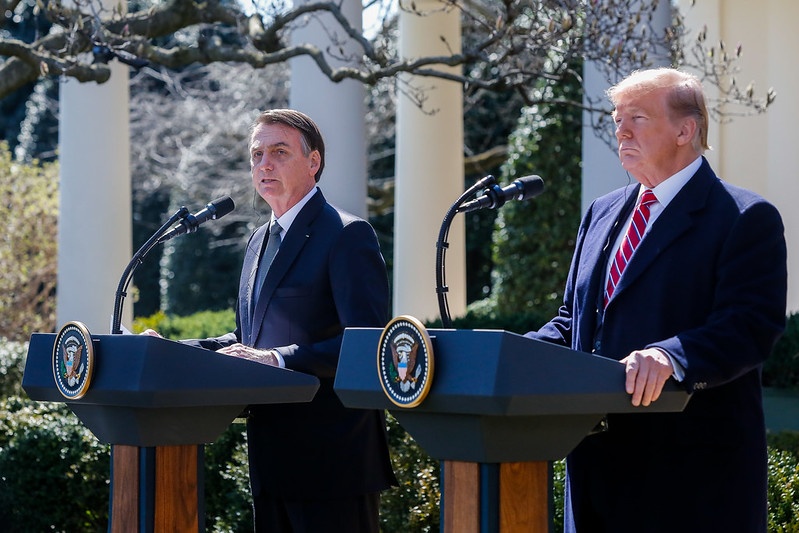News
Why Brazil’s Bolsonaro is following Trump’s pre-election playbook
The day after the attack on the US Capitol in January 2021, Brazil’s president Jair Bolsonaro threatened: “If we don’t have printed ballot papers in 2022, so we can check the vote, we’re going to have worse trouble than in the United States.”
For the past four years Bolsonaro has been telling his political base that the voting system is not to be trusted, echoing tactics used by former US president Donald Trump before the last US election.
Bolsonaro’s attacks on the political system are now escalating ahead of Brazil’s 2022 national elections in October.
Currently, Bolsonaro is projected to lose in every scenario devised by pollsters. This would represent a significant legal threat to any elected politicians who lose their seats, they would lose legal protections such as the right to be tried only in the supreme court.
The list of possible allegations against the Bolsonaro administration include collusion with armed militias in Rio de Janeiro, spreading fake news, corruption and embezzlement of public funds and, in the president’s case, his catastrophic handling of the public health crisis of COVID-19, which has already been part of a public inquiry.

Throughout his political career, Bolsonaro, like Trump, has repeatedly revealed his contempt for democratic institutions and playing by the rules. He praised the military coup of 1964 (calling it “the second Independence Day”), and the practices of that military regime, which tortured and murdered political opponents.
As a federal legislator for Rio de Janeiro, he claimed that the dictatorship should have killed “at least 30,000” citizens, among them the then president, Fernando Henrique Cardoso. One of Bolsanaro’s pledges, while campaigning in 2018, was to reward police officers for killing criminal suspects.
Once elected president, he praised Rio de Janeiro’s police for shooting dead 28 people during a raid on a favela. As head of state he has also consistently resisted any limitations imposed on him, whether by the provisions of the constitution, the actions of the opposition, the checks and balances built into the federal separation of powers, or critical press coverage.
Like Trump, Bolsonaro started this process of undermining confidence in the democratic process some time ago by claiming that elections were fraudulent.
He has repeatedly questioned both the electronic voting and vote-counting process, and the impartiality of the electoral courts which organise and regulate elections in Brazil.
His attacks on the reliability of the electoral system have been reinforced by the mass distribution of digital misinformation through social media.
His fake news strategy, targeting his electoral rivals, was unleashed first by his campaign team and supporters.
In October 2018, elections for state and federal deputies were held concurrently with the presidential ballot, and some legislative candidates on the same party ticket as Bolsonaro spread rumours about the soundness of the electoral process. Fernando Francischini, a Bolsonaro supporter, who was elected state deputy in Paraná, in the south of Brazil, alleged, without any evidence, that some electronic ballot boxes had prevented people from voting for Bolsonaro and had been seized.
Judges at the Superior Electoral Court (TSE) ruled in October 2021 that this had not occurred, and Francischini was stripped of his seat for disseminating digital disinformation in 2018.
Since then the lie has been repeated over and over by Bolsonaro, who even tried to jettison Brazil’s well-regarded electronic voting system, introduced in the late 1990s, with a paper-based one, which had proven more susceptible to fraud and abuse in the past. While there have been no cases of proven electronic manipulation of electoral results in Brazil, all electronic systems have potential vulnerabilities and a lack of information contributes to high levels of public distrust that can be exploited.
In any case, the constitutional amendment failed to get the necessary votes in congress to pass and the TSE, noted that, while the court would not act on the misconduct in 2018, it would punish any repetition in 2022: “the registration of candidacies will be cancelled and those who engage in this activity will go to jail”.
According to the Bolsonaro’s faithful supporters, a plot has been hatched between the polling institutes, opposition parties, corrupt elites in the judiciary, the press, and even social media companies, to prevent his re-election and put his nemesis, former president Luiz Inácio Lula da Silva, back in power. The 2021 decision by the supreme court to overturn Lula’s convictions for corruption, which had kept him out of the political picture in 2018, is seen as part of this ruse.
Bolsonaro’s attacks on the political system are escalating ahead of the elections. Some of his staunchest supporters are military police officers and security personnel and firearms registrations have surged under Bolsonaro’s deregulation of gun ownership, raising fears of a situation like the invasion on the US Capitol. Brazil’s democratic institutions will have to work hard to maintain the legitimacy of the system and ensure a peaceful transfer of power.![]()
Fiona Macaulay, Professor of Gender, Peace and Development, University of Bradford and Cláudio Gonçalves Couto, Associate professor, Brazilian School of Public and Business Administration (EBAPE/FGV)
This article is republished from The Conversation under a Creative Commons license. Read the original article.





















